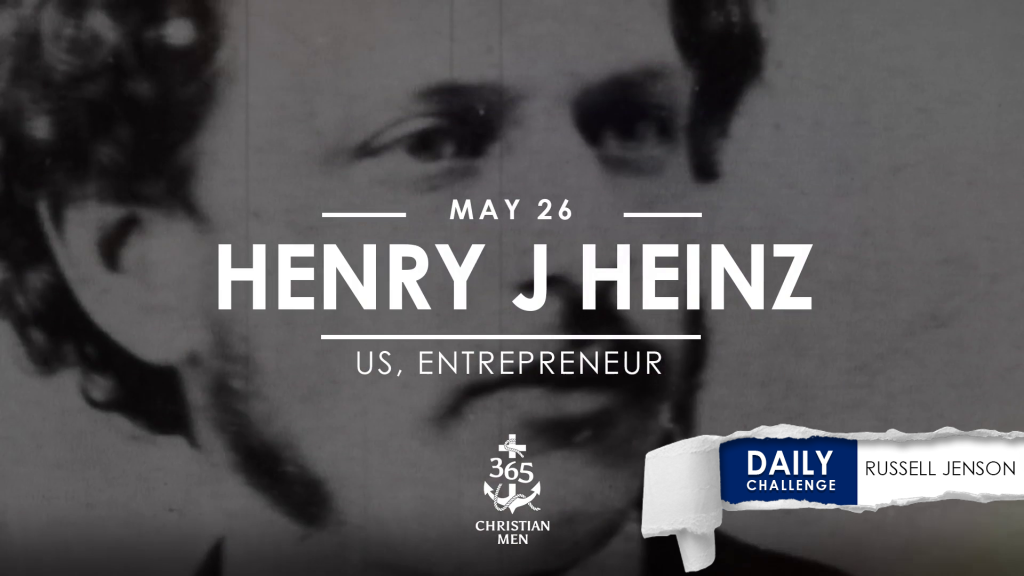May 26. Henry J. Heinz. When Henry was very young, he helped his mother make and sell pickles. He sold homemade grated horseradish in clear glass jars so his customers could see that he was not cheating them by adding turnips or wood pulp to his product.
When he was 12, he had his own vegetable plot, which he tended with zeal and skill. Soon, he was selling both his grated horseradish and his surplus garden produce to the local greengrocer. By the time he graduated from high school, he had to hire workers to help him.
Henry went to a top-notch business college, financed completely from his vegetable sales. After he graduated, he joined the growing canned-goods food industry.
That business did well until a combination of bumper crops and bank failures resulted in bankruptcy. Henry then started the Heinz Food company, which eventually grew into a national company known for quality organic production, a family-type working atmosphere, health and other benefits for his workers, and innovative advertising.
On this date in 1909, Henry convened the first board meeting of HJ Heinz & Co. By 2012, the company was an international success that employed around 32,000 people in more than 6 countries. Into the second decade of the century, Heinz embraces goals, which call for action toward ending poverty and protecting the planet.
Through Christ, in success and in failure, we can act with integrity.
Thirty-one-year-old Henry J. Heinz lay ill. His business bankrupt. How would he meet the final payday for his faithful employees, never mind Christmas presents for his wife and two children?
For a hard worker who’d been honing his entrepreneurial skills since he was eight, this failure was devastating. He’d brought all his Christian principles into his business dealings and had never known a day without work—suddenly helpless.
When he was 8, Heinz sold the surplus produce from his mother’s garden. By 16, his business had grown to employ three women, and he delivered to Pittsburgh grocers three times a week in his own wagon. By 28, he’d formed Heinz, Noble and Company and expanded their operational facilities into St. Louis and Chicago.
As usual, Heinz obsessed over ways to make this expansion efficient. In 1875, he contracted with an Illinois farm to buy all the cucumbers and cabbage they produced. It was a good plan. If only that year hadn’t produced a bumper crop.
Suddenly the cost of the vegetables they’d contracted to buy far exceeded their cash on hand. Failing banks meant no money to borrow to meet their commitment. They couldn’t bottle or sell the product fast enough, either.
By October of that year, Heinz was struggling to meet his financial commitments and avoid bankruptcy. In November, he wrote in his diary, “I have two thousand dollars to meet tomorrow, and not a penny to meet it with.”
By December, the end had come. He met the final payday with money borrowed from his wife—money she had brought into the marriage, but which he kept in an account for her.
But that same Christmas, he received an inspiring gift. With no money for material things, Heinz’s mother wrote him a card, a reminder of Christ’s faithfulness and a prayer of blessing on his efforts to provide for his family. She ended her note reminding him that his life in Christ was the most important thing.
Heinz painstakingly noted every penny he owed and to whom, determined to repay them because it was the right thing to do in the sight of God. By February, he was ready to start again. With borrowed money, he embarked on a new quest—F. And J. Heinz Company. Then he did what he had always done—he worked hard and trusted God.
Heinz lived out the Apostle Paul’s instructions: “Whatever you do in word or deed, do all in the name of the Lord Jesus, giving thanks through Him to God the Father,” (Colossians 3:17, NASB).
And his business thrived, in spite of the previous failure because people recognized Henry Heinz’s integrity as a businessman.
It took several years, but Henry Heinz paid off every creditor of his failed company even though he was not legally bound to do so. And he led the newly formed H. J. Heinz and Company into a worldwide, multi-million-dollar business known for taking care of creditors, customers, and employees.
Henry Heinz defined his success by the way he treated people, so even in his failure he found success by living a life pleasing to Christ.
In what ways do your business principles reflect what you believe about Christ? Through Christ, in success and in failure, we can act with integrity.
“Henry J. Heinz Biography: Success Story of Heinz Ketchup Empire.” Astrum People. Accessed August 11, 2020. https://astrumpeople.com/henry-j-heinz-biography/.
E.D. McCafferty. Henry J. Heinz, a biography (New York: Bartlett Orr Press, 1923) 81. On google books:
Story read by Peter R Warren, https://www.peterwarrenministries.com/





